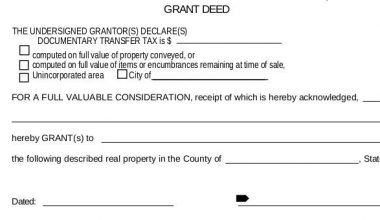Not keeping up with mortgage payments simply means the creditor will take legal actions. Many times, it leads to losing one’s home, which is something we all want to avoid. Losing a house you bought with a mortgage loan back to your creditor is painful. Trust me, you do not want to be there. However, before someone’s home is completely taken away, there is a legal right that protects your interest. This is known as the right of redemption in real estate. This guide is an overview of what the right of redemption is, its types-equitable and statutory, how to exercise yours as a homeowner, and the processes of getting back your asset before and after foreclosure. We will also look at how the real estate right of redemption in Alabama.
Right Of Redemption Real Estate
When a debtor defaults on payment over some time, the loan provider can file for foreclosure on the said property. This automatically grants them the right to seize the house and place it for sale. This is a foreclosure in real estate. For someone who defaults on loan payments, can I get back my house even after my creditor takes hold of it? Yeah, you still stand a chance to get back your property through the right of redemption but then, what is the right of redemption?
What Is the Right of Redemption?
In real estate, the right of redemption is the legal privilege of a debtor to reclaim a property when certain requirements after meeting a debtor’s financial demands before and after foreclosure. It gives the debtor a specified period to reclaim their asset if they can come up with the money to satisfy their obligation.
Funny enough, this right usually sits at the center of argument as people often doubt the possibility for someone who defaults on payment to meet up the monetary obligation of owning back their property. This is because anyone who faces a foreclosure has financial issues already. So meeting up with the demands of redemption right seems impossible. However, circumstances do change and if you were able to lay hold on finance, you can reclaim the home you genuinely love. Rather than lose it completely. Especially if there are memories you hold dear with the asset in question.
There are certain points to note with this right,
- Mortgagees must pay their lenders the full amount of their overdue debt,
- Debtors must also pay additional default-related fines
- The price the house was sold at foreclosure
Types of the Right of Redemption
Generally, there are two types of redemptive rights. The equitable right of redemption and the statutory right of redemption.
Equitable Right of Redemption
Loan defaulters who desire to use the equitable right of redemption must be willing to discharge any financial obligation to the creditor to prevent foreclosure proceedings and redeem the property in question. The defaulting mortgagor must redeem his or her equity within a particular period. The time frame is usually from the default of payment till the commencement of foreclosure. Once a foreclosure begins, the equitable right of redemption ceases.
In summary, the equitable right of redemption permits a debtor to reclaim their mortgage by paying the full amount he owes a mortgage provider before the foreclosure sale takes place. Additionally, the equitable right to redeem is available in every state.
How Does Equitable Redemption Work?
Even if the entire debt on your property exceeds the home’s market worth, if you intend to redeem, then you must pay off what you owe on the house in order to exercise an equitable right of redemption.
Exercising Redemptive Right
In exercising your redemptive right, you must pay off the following:
- A mortgagee’s principal
- Late payment penalties
- Taxes
- Sales costs
- Interest on the remaining principal
Statutory Right of Redemption
In real estate, a borrower whose house had been seized by a creditor can redeem his house with the statutory right of redemption only after a foreclosure sale has been carried out. In other words, a statutory right of redemption only comes to play after a foreclosure sale. However, the debtor will have to clear the new owner’s purchase price must as well as other charges that come with it. As much as this right seems better than the equitable right to redeem, it is not a practice in every state.
How Does the Statutory Right of Redemption Work?
The real estate statutory right of redemption is not available in every state. This means if you will be using the right, you need to first find out if the law permits it in your state. You can look that up on United States foreclosure websites. Also, foreclosure sales must be carried out on the property before utilizing this right. After the sale, you are given a redemption period immediately after the foreclosure sales. Debtor received a specified number of days to reclaim.
Mostly, homeowners who wish to exercise the statutory right of redemption will send a demand letter to the party who bought the house at the final foreclosure sale.
The letter must include a request for a list of payments that you must make to reclaim the property. The new buyer will have a set amount of time after receiving the letter to react by submitting a statement of charges. Secondly, you will also write a letter to the person in charge of managing the foreclosure process.
The original homeowner will need to file a claim for statutory redemption after they get this document. After filing for a reclaim, the homeowner is legally expected to pay the entire redemption amount. This includes the price of the property at the foreclosure sale, plus interest and any extra costs.
Homeowners that can afford to meet the demand will get back their properties. Unfortunately, this happens on rare occasions. At times, debtors are unable to meet the monetary demands. When this happens, the homeowner loses his right to reclaim and permanently lose the house too. This simply means you forfeited your right to reclaim. After making a payment, the lender refunds the third party that initially bought the house from them.
What Happens if I Am Not Able to Meet the Payment Requirements in Right of Redemption?
When homeowners are not able to meet the payment demands, they forfeit the right to redeem the property. This simply means the original homeowner waived the statutory right. As a result, they will have to vacate the building as soon as possible. Failure to vacate of your free will means you will face forceful ejection or law charges. This is because you have lost every right you once had on the house.
How Much Time Do I Have to Process the Right of Redemption?
The duration of time you have to exercise your statutory right of redemption varies from state to state. You have to first find out the kind of redemptive right your state accepts. Then there is a need to verify the length of time it permits. However, the duration mostly ranges from 30 days to one year.
Factors That Determine the Duration of Redemption Rights
Some of the factors that affect the duration allowed on redemptive rights are as follow;
#1. The foreclosure involved
The type of foreclosure involved is the first factor that affects the duration of a redemptive right. There are generally two types of foreclosures. Judicial and non-judicial foreclosures. The judicial foreclosure demands the creditor file a complaint to a court before beginning the foreclosure process. The non-judicial foreclosure permits the creditor to simply begin his process when a debtor defaults on payment for some time.
#2. When the property was bought.
When the property was bought also affects the duration of your redemptive right. Was it before or during the foreclosure process?
#3. State of the loan document
This has to do with whether the homeowner forfeited their right in the loan document before taking the loan.
#4. Whether or not the property was abandoned by the owner.
If the owner occupies the property in question, he may be given a longer time to see if he could meet up with the payment
Can I Stay on the Property During the Redemption Period?
Staying on the property in question during foreclosure or the redemption period, largely depend on the state in question. Some states permit this and some require the homeowner to move out of the house once it a debtor seizes a house. To be sure a homeowner can stay on the property during the redemption period, you can look up your state’s rules and seek legal assistance from a local real estate lawyer. Doing this will you help avoid forceful ejection or being charged with trespass.
When Can the Redemption Right Be Used?
The redemption right of a debtor is exercised during the redemption period. The redemption period occurs before or after the foreclosure auction on a property. However, most often than not, the right is not utilized. This is because redeeming a house cost more than keeping up your mortgage payment. Except something great happens, sometimes, the debtor waives it.
Redemption Right Limitation
Although the equity right is available, only a small percentage of homeowners are able to avoid foreclosures. This is due to the fact that many homeowners were unable to repay their debts. They would not have missed their mortgage payments and gone into default if they had the money. Even with financial limitations, homeowners on the verge of losing their homes can opt to remodify their loans. A modified loan is easier to handle than dealing with foreclosure.
Right of Redemption in Alabama
In Alabama real estate law, debtors are allowed either the equitable right of redemption or the statutory right of redemption. Borrowers who pay the full amount owed on their mortgage before the foreclosure is completed have the equitable right of redemption. This allows them to reclaim their mortgage. Furthermore, debtors can retrieve their properties following a foreclosure under the statutory right of redemption in Alabama too.
How the Right of Redemption Works in Alabama
Before the change in Alabama law was effected in 2018, a debtor receives 180 days of redemptive periods after a foreclose sale. The law mandates a foreclosing party to notify the homeowners of their right to redeem the property at least 30 days before the foreclosure sale. When the creditor fails to send the certified mail, the redemption period lasts up to two years. Particularly when the creditor did not send the notification
However, the new Alabama law on the right of redemption only allows a redemptive period of one year. It states that faulty or missing notice about the right to redeem would not invalidate the foreclosure sale. Also, any action a homeowner wants to take must be within one year after the foreclosure sale. More elaborately, a redeemer must pay the purchase price in addition to the value of any upgrades within the equitable or statutory term to redeem.
There Are Two Cases With the Alabama Right to Redeem After Foreclosure
There are two rare cases in the Alabama right of redemption.
The first is this, other parties, such as debtors who had liens on the home, may be able to redeem the property.
Secondly, IRS may also redeem the property following a judicial or nonjudicial foreclosure if the home had a federal tax lien on it. The IRS has 120 days to redeem but they will give you an advance notification if they decide to do this.
What is right of redemption in Alabama?
The original owner has a year from the date of the foreclosure sale to redeem the property by paying off any overdue taxes or liens that are attached to it. For homestead property, the redemption window is 180 days.
What are the two types of redemption?
in general The two types of redemption are statutory redemption and equitable redemption.
What does the right of redemption allow?
Even after their lender begins the foreclosure process or lists the home for public auction, homeowners who exercise their right of redemption are still able to keep their homes if they make their mortgage payments in full.
What is the power of redemption?
It’s not enough to employ the phrase “redemption” in religious contexts. It has the ability to put us back in the position we were in with God before the fall. Redemption grants followers of Christ the same legal standing with the Father that Jesus enjoyed while He was on earth.
Can right of redemption be sold?
Because the right to redeem is statutory, the mortgagee may require the buyer to sell the property back within the redemption period. In the event that the buyer declines, the mortgagee has two options: present payment to the sheriff who oversaw the foreclosure auction or consign the money in court.
What are the limits of redemption?
The amount of times a coupon, code, or voucher can be redeemed is limited. Redemption caps aid businesses in defending themselves against fraudulent coupon use and exploitation of promotions.
What is an example of redemption?
A coupon or gift card, for instance, is a type of redemption since the value of the coupon or card is exchanged for a good or service.
Right of Redemption Foreclosure
The right to redeem a property when it comes to foreclosures can be handled in two ways.
The first is right before the foreclosure proceeds and the second is immediately after the foreclosure sales end.
The first is known as the equitable right of redemption which gives you the right to redeem the said property before the foreclosure process begins. If you want to use this right, you will be required to clear your default loan and interest for breach of contract.
The second form of redemptive right with foreclosure in real estate is the statutory right of redemption. This right permits the homeowner to redeem his house even after the sale is concluded and someone else bought the house.
Conclusion
The right of redemption allows homeowners to keep their properties even if they have fallen behind on their mortgage payments and are in default. The problem is that if you’ve already fallen behind on your mortgage payments, you might not be able to afford to exercise this legal entitlement.
FAQs On Right of Redemption
How Common Is Equitable Redemption?
Homeowners rarely use the equitable redemption right. Therefore fore there is no frequent utilization.
When Does Equitable Redemption Apply?
In real estate, the equitable right of redemption apply immediately a mortgagee seizes a homeowner’s property. But the right is aborted as soon as foreclosure sales take place.
What is the difference between Equitable and statutory right of redemption
The major difference between these two rights is that the formal is utilized before the foreclosure sale and the latter is utilized after the foreclosure sale.






